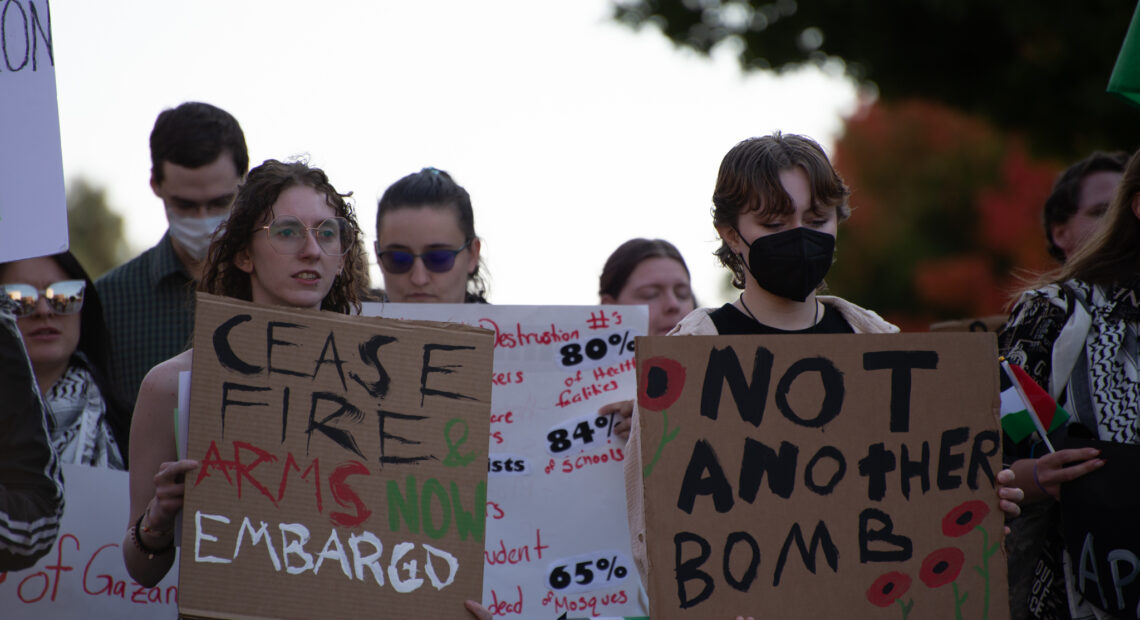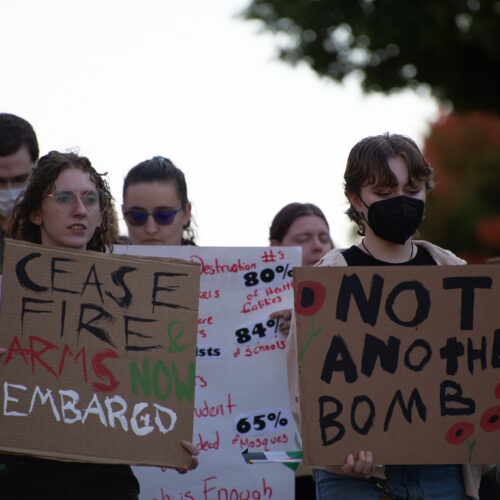
Students, Pullmanites gather in support of Palestine
Listen
(Runtime 0:57)
Read
-

- Connor Luce holds a sign reading “Divest Divest Divest” in front of the Compton Student Union at WSU. (Credit: Phineas Pope / NWPB)
-

- Protesters hold signs reading “Divest from Apartheid” and “Boycott divestment sanctions” in front of the Compton Student Union at WSU. (Credit: Phineas Pope / NWPB)
-

- Khalid Abualtin, a 19-year-old Palestinian American, speaks in front of the Compton Student Union at WSU Pullman. Abualtin came to WSU last year, and says watching what’s happened in Gaza has spurred him to advocate for other Palestinians. (Credit: Phineas Pope / NWPB)
-

- Protesters hold signs reading “Not another bomb” and “Cease fire arms embargo” (Credit: Phineas Pope / NWPB)
-

- A protester holds a sign reading “1 Year of Genocide | Free Palestine” (Credit: Phineas Pope / NWPB)
Around 30 to 40 university students and Pullman community members gathered on the Washington State University campus on Monday to call for a ceasefire in Gaza and issue statements of support for Palestinian people.
Student protesters called for the university to divest from companies that “support the illegal genocide, displacement, and subjugation of Palestinians,” according to an online petition.
Khalid Abualtin is a Palestinian American who came to WSU last fall, shortly before the Oct. 7 attack by Hamas. He said watching what’s happened in Gaza made him more determined to advocate for other Palestinian people.
“I think every human on a fundamental level has to reject the cruelty and the evil that is happening right now in Gaza,” he said. “That is why I’m here today, because the genocide is anti-human. They are slaughtering children en masse.”
Since the Oct. 7, 2023, attack by Hamas on Israel where approximately 1,200 people were killed, and more than 200 others taken hostage, Palestinian health authorities have estimated that ground and air campaigns by the Israeli military in Gaza have killed more than 41,500 people, according to Reuters.
While the Israeli government has said those numbers are suspect, the United Nations’ human rights office has stated the number is likely an undercount.
In addition to the divestment campaign targeting WSU, the community group Pullman for Palestine also stated support for the city of Pullman to adopt a ceasefire resolution, to then be sent to state representatives.
Leda Zakarison is one of the organizers working with Pullman for Palestine. She said cities like Bellingham, Seattle, Tacoma and Port Townsend have already adopted similar resolutions.
She said the move is important to show that community members in eastern Washington, whether they’re students or not, care about the issue.
“We hear a lot that like, ‘Oh, this is something that people in Seattle care about, but people in eastern Washington don’t care about this issue,’” Zakarison said. “We really want to get it on the historical record that we here in eastern Washington are just as passionate about calling for an end to the genocide.”
Following a series of speakers and chanting outside of the Compton Union Building at WSU, the group marched downtown to attend a listening session for public feedback on a draft resolution written by city council members Carla De Lira and Eric Fejeran.
No counter-protesters attended the gathering, but some individuals heckled the group from cars or windows as the protesters marched past fraternities and student housing.
Some others whistled and shouted in support, and an occasional car honked for the group as they gathered outside of Neill Public Library, where the listening session was held.
Around 18 people spoke at the session, all offering support for the resolution or support with some edits.
Larry Fox said he is a member of the Jewish Community of the Palouse but was only speaking on his own behalf.
He said he supported the resolution with edits, asking, among other things, that the word “disproportionate” be struck when referring to loss of life in Gaza.
“Clearly, you could argue that point but it adds nothing to the resolution. We’re calling for a resolution for a ceasefire,” he said. “There’s plenty of blame to go around on both sides. It’s a judgmental word and I think it really needs to be struck.”
Several other speakers voiced support of maintaining the word “disproportionate,” or stating specific numbers. Some speakers advocated for the city adding economic sanctions modeled after divestments taken by some cities against apartheid South Africa. Others suggested alternative wording to “hostages” and “prisoners.”
Beder Bourahmah, who lives in Pullman, spoke at the meeting in favor of the resolution. However, he said he did not believe the resolution did enough to recognize the history of what happened before Oct. 7, such as the “Nakba.”
“Nakba” is an Arabic word that translates to “the catastrophe” and is used to describe the dispossession and displacement of roughly 750,000 Palestinians during the 1948 Arab-Israeli War.
“However,” Bourahmah said, “It calls for peace … it says the most important thing; enough is enough.”
No one at the event spoke against the resolution.



















